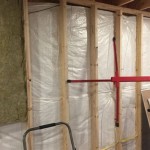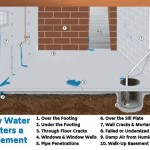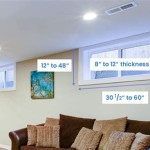What Is Ideal Basement Humidity Level?
Basements are often prone to high humidity levels due to factors like poor ventilation, water seepage, and lack of sunlight. Maintaining optimal humidity levels in your basement is crucial as excessive moisture can lead to various problems, including mold growth, structural damage, and increased energy bills.
The ideal humidity level for a basement is between 30% and 50%. Humidity levels below 30% can cause dry air, leading to discomfort, static shocks, and damage to wooden furniture. Conversely, humidity levels above 50% create an environment conducive to mold growth and other moisture-related issues.
Several factors can affect the humidity level in your basement, including:
- Ventilation: Poor ventilation can trap moisture in the basement, leading to high humidity levels.
- Water seepage: Leaks or cracks in the foundation or walls can allow water to enter the basement, raising humidity levels.
- Lifestyle activities: Activities like showering, cooking, and drying clothes can release moisture into the basement air.
- External moisture: Humidity can enter the basement from the surrounding soil, especially during periods of heavy rainfall or flooding.
Measuring the humidity level in your basement is essential for monitoring and maintaining an optimal environment. Several methods are available to measure humidity, including:
- Hygrometer: A hygrometer is a device that measures the relative humidity in the air.
- Psychrometric chart: A psychrometric chart is a graphical representation of the relationship between temperature, humidity, and other atmospheric properties.
If the humidity level in your basement is consistently high, several steps can be taken to reduce it:
- Improve ventilation: Install exhaust fans or vents to increase air circulation and remove excess moisture.
- Address water seepage: Seal any leaks or cracks in the foundation or walls to prevent water from entering the basement.
- Reduce moisture sources: Use a dehumidifier to remove excess moisture from the air. Cover exposed soil in the basement with a vapor barrier.
- Control lifestyle activities: Limit activities that release moisture into the basement air, such as showering or drying clothes.
Maintaining optimal humidity levels in your basement is essential for preventing moisture-related problems and ensuring a healthy and comfortable living environment. By understanding the ideal humidity range and implementing effective moisture control measures, you can keep your basement dry and free from excess moisture.

How To Achieve An Ideal Basement Humidity Of 30 50

How To Achieve An Ideal Basement Humidity Of 30 50

How To Achieve An Ideal Basement Humidity Of 30 50

What Is The Ideal Basement Humidity Level Epp Foundation Repair

A Guide To Controlling Nc Home Humidity Newcomb And Company

How To Lower Your Basement S Humidity Level

How To Achieve An Ideal Basement Humidity Of 30 50

Relative Humidity Chart For Ideal In The House

5 Effective Tips To Reduce Humidity In Your Basement News And Events For Thrasher Foundation Repair

What Should Humidity Be In A Crawl Space Nia








